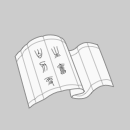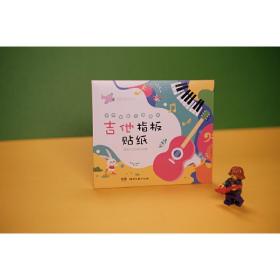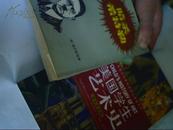
美国学生艺术史(英汉双语版)(套装上下册)
正版全新
¥ 25.55 4.3折 ¥ 59.8 全新
库存11件
上海浦东
认证卖家担保交易快速发货售后保障
作者(美)维吉尔·M·希利尔 著,章智源 译
出版社天津人民出版社
ISBN9787201077314
出版时间2012-09
装帧平装
开本16开
纸张胶版纸
定价59.8元
货号945815
上书时间2024-03-24
- 在售商品 暂无
- 平均发货时间 21小时
- 好评率 暂无
- 最新上架
商品详情
- 品相描述:全新
- 商品描述
-
【书 名】 美国学生艺术史(英汉双语版)(套装上下册)
【书 号】 9787201077314
【出 版 社】 天津人民出版社
【作 者】 (美)维吉尔·M·希利尔 著,章智源 译
【出版日期】 2012-09-01
【版 次】 1
【开 本】 16开
【定 价】 59.80元
【编辑推荐】
★特别推荐 美国学生世界地理(英汉双语版)(上下册):西方家庭学校经典教材与经典读物
《美国学生艺术史》专为美国学校4-8年级孩子们而编写,出版后也深受成人读者的喜爱,是一本了解和欣赏世界艺术的经典读本。《美国学生艺术史》是一本生动而吸引孩子们学习艺术史的读本,完全脱离了那种传统教材的编写模式,让孩子们一点也不觉得陈旧乏味……
——《纽约时报》书评
《美国学生艺术史》是极其少见的优秀课本,清晰而引人入胜的内容、精致的艺术图片,使其不同于其他关于艺术史的教材。
——《哈珀》杂志
【内容简介】
《美国学生艺术史》专为美国学校4-8年级孩子们而编写,出版后也深受成.人读者的喜爱,是一本了解和欣赏世界艺术的经典读本。《美国学生艺术史》是一本很生动而吸引孩子们学习艺术史的读本,接近脱离了那种传统教材的编写模式,让孩子们一点也不觉得陈旧乏味……
【目录】
PART I PAINTING · 绘 画
01 THE OLDEST PICTURES IN THE WORLD ◆ 世界上*古老的画
02 WHAT’S WRONG WITH THIS PICTURE ◆ 这画有毛病吗
03 PALACE PICTURE PUZZLES ◆ 王宫拼图
04 APRIL FOOL PICTURES ◆ 愚人画
05 JARS AND JUGS ◆ 瓶罐上的画
06 PICTURES OF CHRIST AND CHRISTIANS ◆ 基督画像和基督徒的画
07 THE SHEPHERD BOY PAINTER ◆ 牧童画家
08 THE ANGEL-LIKE BROTHER ◆ 天使般的弟兄
09 BORN AGAIN PAINTERS ◆ 再生的画家
10 SINS AND SERMONS ◆ 罪恶与布道
11 A GREAT TEACHER AND A “GREATEST” PUPIL ◆ 伟大导师和“*伟大”学生
12 THE SCULPTOR WHO PAINTED PICTURES ◆ 画画的雕刻家
13 LEONARDO DA VINCI ◆ 列奥纳多· 达· 芬奇
14 SIX VENETIANS ◆ 六个威尼斯人
15 A TAILOR’S SON AND A MASTER OF LIGHT ◆ 裁缝之子和光影大师
16 FLEMINGS ◆ 佛兰德斯人
17 TWO DUTCHMEN ◆ 两个荷兰人
18 ü AND JR. ◆ 丢勒和小霍尔拜因
19 FORGOTTEN AND DISCOVERED ◆ 遗忘与发现
20 SPEAKING OF SPANIARDS ◆ 话说西班牙画家
21 LANDSCAPES AND SIGN-BOARDS ◆ 风景画和广告牌
22 STIRRING TIMES ◆ 动荡的年代
23 A LATE START ◆ 后来居上
24 THREE ENGLISHMEN WHO WERE DIFFERENT ◆ 三个不同的英国人
25 SOME VERY POOR PAINTERS ◆ 几位非常贫穷的画家
26 THE MOST IMPORTANT PERSON ◆ *重要的角色
27 POST-IMPRESSIONISM ◆ 后印象主义
28 EARLY AMERICANS ◆ 早期美国画家
29 MORE AMERICANS ◆ 更多的美国画家
30 TWO EUROPEAN AMERICANS ◆ 两个欧洲美国人
31 REAL-MEN ARTISTS ◆ 真正的男子汉画家
PART II SCULPTURE · 雕 刻
32 THE FIRST SCULPTURE ◆ *初的雕刻
33 GIANTS AND PYGMIES ◆ 巨像和小雕
34 CHERUBS AND KINGS ◆ 基路伯和国王
35 MARBLES ◆ 大理石雕像
36 STANDING NATURALLY ◆ 自然的站姿
37 THE GREATEST GREEK SCULPTOR ◆ 古希腊*伟大的雕刻家
38 AFTER PHIDIAS ◆ 菲迪亚斯之后
39 PLASTER CASTS ◆ 石膏摹制品
40 TINY TREASURES ◆ 宝石小雕
41 BAKED EARTH SCULPTURE ◆ 陶土雕刻
42 BUSTS AND RELIEFS ◆ 半身像和浮雕
43 STORIES IN STONES ◆ 石头里的故事
44 THE GATES OF PARADISE ◆ 天国之门
45 A TREASURE HUNTER AND A SECRET ◆ 寻宝人和秘密
46 NEXT BEST AND BEST ◆ *优秀和第二优秀的骑马雕像
47 FOUR IN ONE ◆ 四合一
48 CELLINI MAKES HIS PERSEUS ◆ 切利尼铸造帕尔修斯铜像
49 A.M. OR AFTER MICHELANGELO ◆ 米开朗基罗前后
50 AN ITALIAN AND A DANE ◆ 一个意大利人和一个丹麦人
51 ON A POSTAGE STAMP ◆ 邮票上的雕像
52 A LION, A SAINT, AND AN EMPEROR ◆ 狮子、圣人和国王
53 A HANDSOME PRESENT ◆ 精美的礼物
54 THOUGHTS FOR THINKERS ◆ 思想者的思想
55 OUR OWN SCULPTURE ◆ 美国的雕刻
56 OUR BEST ◆ 美国*棒的雕刻家
57 DANIEL CHESTER FRENCH ◆ 丹尼尔· 切斯特· 佛兰奇
58 WOMEN’S WORK ◆ 女雕刻家的作品
59 THE END OF THE TRAIL ◆ 路的尽头
PART III ARCHITECTURE · 建 筑
60 THE OLDEST HOUSE ◆ *古老的房子
61 HOUSES FOR GODS ◆ 神 庙
62 MUD PIE PALACES AND TEMPLES ◆ 土饼宫殿和神庙
63 THE PERFECT BUILDING ◆ 完*的建筑
64 WOMAN’S STYLE BUILDING ◆ 女性风格的建筑
65 NEW STYLES IN BUILDINGS ◆ 建筑新风格
66 ROME WAS NOT BUILT IN A DAY ◆ 罗马非一日所建
67 TRIMMINGS ◆ 装饰物
68 EARLY CHRISTIAN ◆ 早期基督教建筑
69 EASTERN EARLY CHRISTIANS ◆ 早期东方基督教建筑
70 LIGHTS IN THE DARK ◆ 黑暗中的亮光
71 ROUND ARCHES ◆ 圆 拱
72 CASTLES ◆ 城 堡
73 POINTING TOWARD HEAVEN ◆ 直入云霄的建筑物
74 IN PRAISE OF MARY ◆ 赞美玛利亚的建筑物
75 COUNTRY CATHEDRALS ◆ 乡村大教堂
76 HERE AND THERE ◆ 欧洲各地
77 OPEN SESAME ◆ 芝麻开门
78 DOME TROUBLE ◆ 麻烦的圆顶
79 BACKWARD AND FORWARD ◆ 回顾过去,展望未来
80 THE HOMES OF ENGLAND ◆ 英国式住宅
81 TRADE-MARKS ◆ 有标记图案的建筑物
82 BREAKING RULES ◆ 打破陈规
83 THE ENGLISH RENAISSANCE ◆ 英国文艺复兴式建筑
84 FROM HUTS TO HOUSES ◆ 从茅屋到房屋
85 AL AND OL ◆ 首都和国会大厦
86 RAINBOWS AND GRAPE-VINES ◆ 彩虹和葡萄酒
87 THE SCRAPERS OF THE SKY ◆ 摩天大厦
88 NEW IDEAS ◆ 新思维
89 NONS AND SURS ◆ 非写实和超现实
90 MORE MODERN PAINTERS ◆ 更多现代画家
91 MODERN SCULPTURE ◆ 现代雕刻
【文摘】
THE OLDEST PICTURES IN THE WORLD
世界上*古老的画
I WAS listening to the teacher, but I had my pencil in my hand.
There were two little
dots about an inch apart on my desk lid. Absent-mindedly I
twisted my pencil point
into one dot and then into the other. The two dots became two
little eyes. I drew a circle around each eye, then I joined the two
circles with a half-circle that made a pair of spectacles.
The next day I made a nose and a mouth to go with the eye and
spectacles.
The next day I finished the face and added ears and some
hair.
The next day I added a hat.
The next day I added a body, with arms, legs, and feet.
The next day I went over the drawing again, bearing heavily on
my pencil. Over and
over again I followed the lines till they became deep grooves in
my desk lid.
The next day my teacher caught me and I caught it!
The next day my father got a bill for a new desk and I got-
Well, never mind what I got.
“Perhaps he's going to be an artist,” said my mother.
“Heaven forbid!” said my father. “That would cost me much more
than a new desk.”
And heaven did forbid.
I know of a school that has a large wooden tablet in the hall
for its pupils to draw
upon. At the top of the tablet is printed:
IF YOU JUST MUST DRAW, DON'T DRAW ON YOUR DESK,
DRAW ON THIS TABLET.
If you put a pencil in any one's hand, he just must draw
something. Whether he is
listening to a lesson or telephoning, he draws circles and faces
or triangles and squares
over the pad-if there is a pad. Otherwise he draws on the desk
top or the wall, for he just must draw something. Have you ever
seen any telephone pad that was not scribbled
upon? We say that's human nature. It shows you are a human
being.
Now, animals can learn to do a good many things that human
beings can do, but one
thing an animal can't learn is to draw. Dogs can learn to walk
on two legs and fetch the newspaper. Bears can learn to dance.
Horses can learn to count. Monkeys can learn to drink out of a cup.
Parrots can learn to speak. But human beings are the only
animals
that can learn to draw.
Every boy and girl who has ever lived has drawn something at
some time. Haven't
you? You have drawn, perhaps, a horse or a house, a ship or an
automobile, a dog or a cat. The dog may have looked just like a cat
or a cat-erpillar, but even this is more than any animal can
do.
Even wild men who lived so long ago that there were no houses.
only caves, to live
in-men who were almost like wild animals, with long hair all
over their bodies-could
draw. There were no paper or pencils then. Men drew pictures on
the walls of their
caves. The pictures were not framed and hung on the walls. They
were drawn right on
the walls of the cave and on the ceiling too.
Sometimes the pictures were just scratched or cut into the wall
and sometimes they
were painted in afterward. The paints those men used were made
of a colored clay
mixed with grease, usually simply red or yellow. Or perhaps the
paint was just blood,
which was red at first and then turned almost black. Some of the
pictures look as if they had been made with the end of a burned
stick as you might make a black mark with the end of a burned
match. Other pictures were cut into bone-on the horns of deer or on
ivory tusks.
Now, what do you suppose these cave men drew pictures of?
Suppose I asked you to
draw a picture of anything-just anything. Try it. What you have
drawn is probably one
of five things. A cat is my first guess, a sail-boat or an
automobile is my second, a house is my third guess, a tree or a
flower is my fourth, and a person is my fifth. Are there any other
kinds?
Well, the cave men drew pictures of only one kind of thing. Not
men or women or
trees or flowers or scenery. They drew chiefly pictures of
animals. And what kind of
animals, do you suppose? Dogs? No, not dogs. Horses? No, not
horses. Lions? No, not
lions. They were usually big animals and strange animals. But
they were pretty well
drawn, so that we know what the animals looked like. Here is a
picture a cave man drew
thousands of years ago.
You know it's a picture of some animal, and it's not a cat or a
caterpillar. It is some animal of the kind they had in those days.
It looks like an elephant and it was a kind of elephant-a huge
elephant. But its ears were not big like our elephants' ears and it
had long hair. Elephants now have skin or hide, but hardly any
hair. This animal we call a mammoth. It had long hair because the
country was cold in those days and the hair kept the animal warm.
And it was much, much bigger even than our elephants.
There are no mammoths alive now, but men have found their bones
and they have put
these bones together to form huge skeletons. We still call any
very big thing “mammoth.”
You've probably heard of Mammoth Cave in Kentucky. It was called
Mammoth, not
because mammoths lived in it, because they didn't, but just
because it is such a huge
cave.
The cave men drew other animals besides the mammoth. One was the
bison, a kind of
buffalo. You can see a picture of a buffalo on our five-cent
piece. It looks something like a bull. A little girl had gone to a
cave in Spain with her father, who was searching for arrow-heads.
While he was looking on the ground, she was looking at the
相关推荐
— 没有更多了 —
















以下为对购买帮助不大的评价